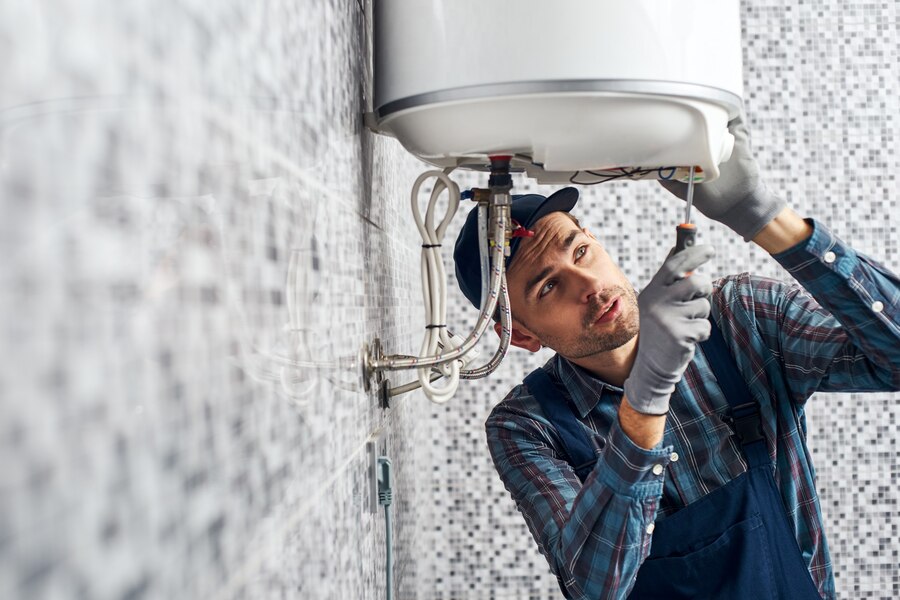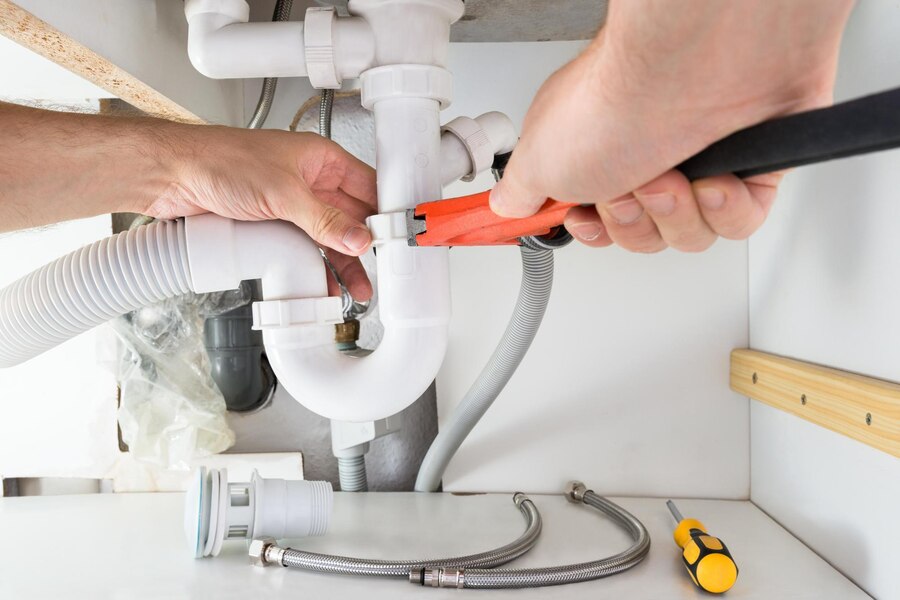
In today’s eco-conscious world, energy efficiency is not just a buzzword – it’s a lifestyle. And one area of the home that often goes overlooked in the quest for energy savings is the water heater. Your water heater plays a significant role in your home’s overall energy consumption, accounting for a substantial portion of your utility bills. However, by upgrading to a more efficient model or considering water heater replacements, you can make a substantial impact not only on your monthly expenses but also on reducing your carbon footprint. Let’s delve into how water heater replacements can be a game-changer for your home’s energy efficiency.
Understanding the Role of Water Heaters in Energy Consumption
Water heaters are often the silent energy guzzlers in our homes, responsible for a significant portion of our monthly utility bills. Whether it’s heating water for showers, laundry, or dishes, traditional water heaters continuously expend energy to maintain a set temperature, even when not in use. Understanding how much energy your water heater consumes can help you make informed decisions about efficiency upgrades and usage patterns, ultimately leading to reduced energy consumption and lower bills.
The Benefits of Upgrading to a High-Efficiency Model
Upgrading to a high-efficiency water heater can bring about numerous benefits beyond just cost savings. These modern units are designed to heat water more efficiently, using less energy while providing the same level of comfort. Additionally, high-efficiency models often come with advanced features such as improved insulation, programmable settings, and even remote monitoring capabilities, enhancing convenience and peace of mind for homeowners.
How Old Water Heaters Contribute to Energy Waste
As water heaters age, they become less efficient at heating water, leading to increased energy consumption and higher utility bills. Sediment buildup, corrosion, and wear and tear can all hinder the performance of an older water heater, forcing it to work harder to maintain desired temperatures. By replacing old, inefficient water heaters with newer, energy-efficient models, homeowners can significantly reduce energy waste and enjoy long-term savings on their utility bills.
Exploring the Latest Innovations in Energy-Efficient Water Heaters
Advancements in technology have led to a wide range of innovations in energy-efficient water heaters. From heat pump water heaters that extract heat from the surrounding air to hybrid models that combine traditional heating methods with modern technology, there are now more options than ever for homeowners looking to improve efficiency and reduce energy consumption. Exploring these latest innovations can help you find the perfect water heater to suit your needs and budget while maximizing energy savings.
Calculating Potential Savings with a New Water Heater
Before investing in a new water heater, it’s essential to calculate the potential savings it can offer compared to your current unit. Factors such as energy efficiency ratings, fuel costs, and usage patterns all play a role in determining the long-term savings of a new water heater. By performing a simple cost-benefit analysis, you can gain insight into how much you stand to save on your utility bills over time, helping you make an informed decision about whether or not to upgrade.
Factors to Consider When Choosing an Energy-Efficient Model
When selecting an energy-efficient water heater, there are several factors to consider to ensure you get the best value for your investment. These include the size and capacity of the unit, the fuel type (electric, gas, propane, etc.), upfront costs versus long-term savings, and any available rebates or incentives. Additionally, factors such as installation requirements, maintenance needs, and warranty coverage should also be taken into account to ensure the chosen model meets your household’s specific needs and preferences.
Tips for Proper Maintenance to Maximize Efficiency
Proper maintenance is key to maximizing the efficiency and lifespan of your water heater. Simple tasks such as regularly flushing the tank to remove sediment buildup, checking for leaks or corrosion, and adjusting the temperature settings can all help improve performance and reduce energy consumption. Additionally, scheduling annual professional inspections and tune-ups can identify potential issues early on, preventing costly repairs and ensuring your water heater operates at peak efficiency for years to come.
Comparing Traditional vs. Tankless Water Heater Efficiency
Traditional tank-style water heaters and tankless water heaters each have their pros and cons when it comes to efficiency. Traditional models store hot water in a tank, which can lead to standby heat loss and higher energy consumption. In contrast, tankless water heaters heat water on-demand, eliminating the need for a storage tank and reducing energy waste. However, tankless models may have higher upfront costs and installation requirements. Understanding the efficiency differences between these two types of water heaters can help you choose the best option for your home and budget.
How Insulation Can Boost Water Heater Efficiency
Proper insulation is essential for maximizing the efficiency of your water heater. Adding insulation to the tank and pipes can help reduce heat loss and minimize the amount of energy needed to maintain hot water temperatures. Additionally, insulating hot water pipes can prevent heat loss during distribution, ensuring hot water reaches your faucets and appliances more quickly and efficiently. By investing in insulation upgrades, homeowners can improve the overall energy efficiency of their water heating systems and enjoy lower utility bills year-round.
Exploring Renewable Energy Options for Water Heating
Renewable energy sources such as solar and geothermal can be excellent options for heating water while reducing reliance on fossil fuels and lowering carbon emissions. Solar water heaters use sunlight to heat water directly or indirectly through solar panels or collectors, while geothermal heat pumps extract heat from the ground to warm water. Although the upfront costs of renewable energy systems can be higher, the long-term savings and environmental benefits make them an attractive option for eco-conscious homeowners looking to reduce their carbon footprint.
The Environmental Impact of Energy-Efficient Water Heaters
Switching to energy-efficient water heaters not only benefits your wallet but also the environment. By reducing energy consumption and greenhouse gas emissions, energy-efficient models help mitigate climate change and preserve natural resources for future generations. Additionally, some energy-efficient water heaters use eco-friendly refrigerants and insulation materials, further minimizing their environmental footprint. Making the switch to energy-efficient water heaters is a simple yet impactful way to contribute to a cleaner, greener planet.
Understanding Energy Efficiency Ratings and Labels
Energy efficiency ratings and labels provide valuable information about the performance and efficiency of water heaters. These ratings, such as Energy Factor (EF) for electric models and Uniform Energy Factor (UEF) for gas models, indicate how much energy a water heater consumes relative to its output. Additionally, ENERGY STAR certification identifies models that meet strict energy efficiency guidelines set by the U.S. Environmental Protection Agency (EPA). Understanding these ratings and labels can help you compare different water heater options and choose the most efficient model for your home.
Government Incentives for Energy-Efficient Water Heater Replacements
To encourage homeowners to invest in energy-efficient upgrades, many government agencies offer rebates, tax credits, and other incentives for qualifying water heater replacements. These incentives can help offset the upfront costs of purchasing and installing energy-efficient models, making them more affordable for homeowners. Additionally, some utility companies offer incentives such as discounted rates or rebates for participating in energy-saving programs or upgrading to high-efficiency appliances. Taking advantage of these government incentives can make energy-efficient water heater replacements a smart financial decision for homeowners.
How to Monitor and Track Your Water Heater’s Energy Usage
Monitoring and tracking your water heater’s energy usage can help you identify opportunities for improvement and ensure optimal efficiency. Installing a smart thermostat or energy monitor allows you to monitor energy consumption in real-time and track historical usage patterns over time. Additionally, some water heaters come equipped with built-in energy usage monitoring features or connectivity options for remote monitoring via smartphone apps or web portals. By staying informed about your water heater’s energy usage, you can make adjustments as needed to maximize efficiency and minimize energy waste.
Future Trends in Water Heater Technology for Improved Efficiency
As technology continues to evolve, so too do water heater innovations aimed at improving efficiency and performance. Future trends in water heater technology include advancements in heat pump technology, improved insulation materials, and integration with smart home automation systems. Additionally, ongoing research and development efforts focus on developing alternative fuel sources and renewable energy solutions for water heating. By staying informed about these emerging trends, homeowners can anticipate future options for upgrading to even more energy-efficient water heating systems.
Upgrading to an energy-efficient water heater is a smart investment that not only reduces your utility bills but also benefits the environment. At SP Plumbing Solutions, we understand the importance of efficient plumbing systems in modern homes. Whether you’re a builder, contractor, or homeowner, we’re here to assist you with your plumbing needs. From water heater replacements to new construction projects, our team is dedicated to providing top-notch service and expertise.
Contact us today at 281-727-6798 to schedule a service call and experience the difference with SP Plumbing Solutions. We’ll treat you right every step of the way.


